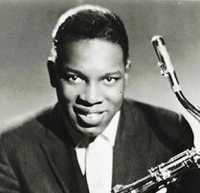Curtis Ousley (February 7, 1934 – August 13, 1971), who performed under the stage name King Curtis, was an American saxophone virtuoso known for rhythm and blues, rock and roll, soul, funk and soul jazz. Variously a band leader, band member, and session musician, he was also a musical director and record producer. Adept at tenor, alto, and soprano saxophone, he was best known for his distinctive riffs and solos such as on "Yakety Yak", which later became the inspiration for Boots Randolph's "Yakety Sax" and his own "Memphis Soul Stew".
Career
King Curtis started playing saxophone at the age of twelve in the Fort Worth area. He took interest in many musical genres including jazz, rhythm and blues, and popular music. As a student pursuing music he turned down college scholarships in order to join the Lionel Hampton Band.[2] During his time with Lionel Hampton he was able to write and arrange music and learn guitar.[2] In 1952 Curtis decided to move to New York and became a session musician, recording for such labels as Prestige, Enjoy, Capitol, and Atco. He was fortunate to record with Nat Adderly and Wynton Kelly,[2], Buddy Holly and Andy Williams.[3]
Stylistically, Curtis took inspiration from saxophonists Lester Young, Louis Jordan, Illinois Jacquet, Earl Bostic, and Gene Ammons.[2] Known for his syncopated and percussive style, he was both versatile and powerful as a musician. He put together a group during his time as a session musician including Richard Tee, Cornell Dupree, Jerry Jemmott, and Bernard Purdie
Move into Rock
King Curtis enjoyed playing jazz and rock but decided he would make more money as a rock musician. From the 1950s until the mid 1960s, he worked as a session player, recording under his own name and with others such as the Coasters, with whom he recorded "Yakety Yak." Buddy Holly hired him for session work, during which they recorded "Reminiscing." Buddy wrote this song, but gave Curtis the songwriting credit for flying down to the session. His best-known singles from this period are "Soul Twist" and "Soul Serenade."
In 1965, he moved to Atlantic Records and recorded his most successful singles, "Memphis Soul Stew" and "Ode to Billie Joe" (1967). He worked with The Coasters, led Aretha Franklin's backing band The Kingpins. The Kingpins opened for The Beatles during their 1965 performance at Shea Stadium. Curtis produced records, often working with Jerry Wexler and recorded for Groove Records during this period.[4]
In 1970, he appeared with Aretha Franklin and The King Pins on Aretha Live at Fillmore West, and another record, King Curtis Live At Fillmore West, which included a version of "Memphis Soul Stew" and covers of Led Zeppelin's "Whole Lotta Love" and Stevie Wonder's "Signed, Sealed, Delivered I'm Yours". The line-up for these performances included: Hammond organ player Billy Preston, bassist Jerry Jemmott, guitarist Cornell Dupree, Pancho Morales (percussion), drummer Bernard "Pretty" Purdie and The Memphis Horns. A cover of Procol Harum's "Whiter Shade of Pale" was taken from this album, and used as the title music in the cult British comedy film, Withnail & I. In July 1971, Curtis recorded saxophone solos on "It's So Hard" and "I Don't Wanna Be a Soldier Mama I Don't Wanna Die" from John Lennon's Imagine.[5] Along with The Rimshots, he recorded the original theme song for the 1971 hit television show, Soul Train.
Death
Around midnight on August 13, 1971[6] Curtis was lugging an air-conditioning unit towards his brownstone apartment on West 86th Street in New York City when he noticed two junkies were using drugs on the steps to his home. When he asked them to leave, an argument started. [7] The argument quickly became heated and turned into a fist-fight with one of the men, 26-year old Juan Montañez. Suddenly, Montañez pulled out a knife and stabbed Curtis in the chest. Curtis managed to wrestle the knife away and stab his assailant four times before collapsing. Montañez staggered away from the scene and Curtis was taken to Roosevelt Hospital, where he died from his wounds less than an hour later.[8]
Montañez was arrested at the same hospital Curtis had been taken to. When police officers investigating the murder learned that another man had been admitted to Roosevelt hospital with stab wounds around the same time as Curtis, they quickly realized that the two events were connected. Montañez was charged with Curtis' murder and subsequently sentenced to a term of imprisonment.[9]
On the day of Curtis' funeral Atlantic Records closed their offices.[10] Jesse Jackson administered the service and as the mourners filed in, Curtis's band 'The Kingpins' played "Soul Serenade". Amongst those attending were Aretha Franklin, Cissy Houston, Brook Benton and Duane Allman.[11] Franklin sang the closing spiritual "Never Grow Old" and Stevie Wonder performed "Abraham, Martin & John and now King Curtis".[12]
Curtis was subsequently buried in a red granite-fronted wall crypt in the 'West Gallery of Forsythia Court' mausoleum at Pinelawn Memorial Park in Farmingdale, New York, the same cemetery that holds Jazz greats Count Basie and John Coltrane
Awards
In 1970, Curtis won the Best R&B Instrumental Performance Grammy for "Games People Play".[14]
Curtis was inducted into the Rock and Roll Hall of Fame on March 6, 2000
King Curtis The Good Old Fifties (1959) Have Tenor Sax, Will Blow (1959) Azure (1960) King Soul (1960) Soul Meeting (1960) Party Time (1961) Trouble in Mind (1961) Old Gold (1961) Night Train (1961) Doin' the Dixie Twist (1962) Country Soul (1962) Soul Twist and other Golden Classics (1962) It's Party Time (1962) The Best of (1962) Soul Serenade (1964) Plays Hits made by Sam Cooke (1965) That Lovin' Feeling (1966) Live at Small's Paradise (1966) Play Great Memphis Hits (1967) Memphis Soul Stew (1967) Sweet Soul (1968) Sax in Motion (1968) Instant Groove (1969) Everybody Talkin (1970) Get Ready (1970) Blues at Montreux (1971)
King Curtis and The Kingpins King Size Soul (1967) Eternally, Soul (1968) with The Shirelles Soul Twist(1962) with The Noble Nights Live at Fillmore West (1971)
